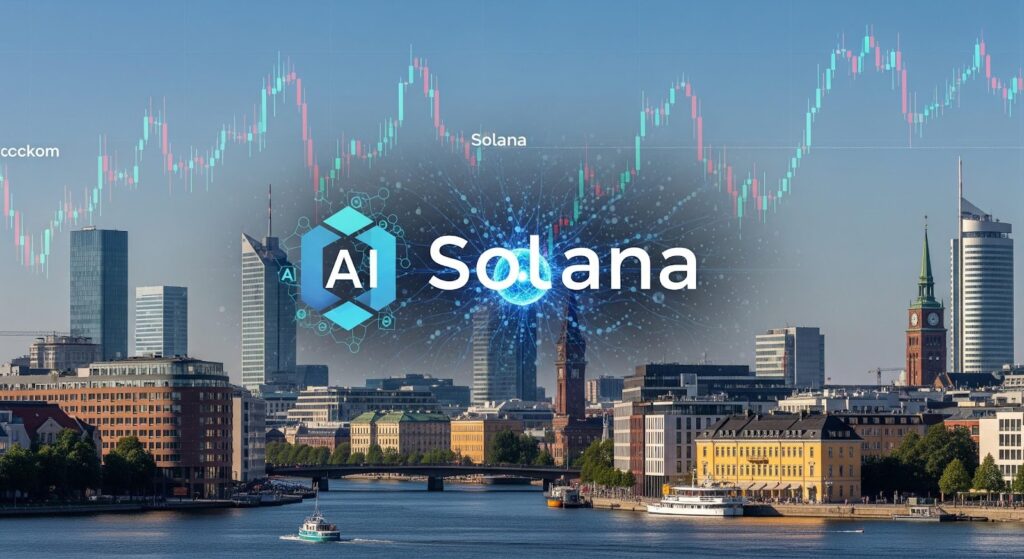The convergence of artificial intelligence and blockchain technology is creating unprecedented opportunities for European startups, with Solana price movements serving as a critical indicator of market confidence in these innovative decentralized AI marketplaces. The intersection of AI and blockchain technology has opened new frontiers for innovation, particularly in Berlin and Stockholm, where a growing ecosystem of startups is leveraging Solana’s high-performance infrastructure to build sophisticated machine learning platforms that democratize access to AI services.
European AI startups have secured around 55% more year-on-year investment in Q1 2025, according to data from Dealroom, demonstrating significant investor confidence in the sector’s potential. This surge in funding comes at a time when Solana’s blockchain infrastructure has proven its capability to handle the computational demands of AI-powered applications while maintaining cost-effectiveness and scalability.
Solana’s Technical Infrastructure for AI Applications
Solana’s blockchain architecture provides compelling advantages for AI and machine learning applications. The network can power thousands of transactions per second while maintaining low costs, high speeds, minimal energy impact, and an easy user experience. These characteristics make it particularly suitable for AI applications that require frequent data processing, model updates, and micropayment transactions.
The blockchain’s performance capabilities address critical challenges in decentralized AI development. AI could reduce friction even further, opening up the power of decentralization to millions of people, as Solana’s infrastructure can handle the computational overhead required for sophisticated machine learning operations without compromising transaction speed or affordability.
Current Solana trading levels reflect strong market confidence in its technical capabilities. As of January 27, 2025, Solana (SOL) is trading at $251.28, representing a value increase of approximately 1,142 times since its initial coin offering in March 2020, when tokens were priced at $0.22 each. This remarkable appreciation demonstrates sustained market confidence in Solana’s technical infrastructure and its potential for supporting innovative applications.
European AI Startup Ecosystem Development
The European AI landscape is experiencing rapid transformation, with Berlin and Stockholm emerging as key hubs for blockchain-integrated AI development. During Berlin Blockchain Week, scheduled for June 12-17, 2025, the city transforms into the ultimate hub for Web3 builders, highlighting Europe’s growing prominence in the intersection of blockchain and AI technologies.
The funding landscape reflects this growing momentum. Paradigm recently invested $50 million in Nous Research, a Solana-powered decentralized AI startup, marking a significant step as the company seeks to carve out a niche in the AI landscape by integrating the principles of decentralization and blockchain technology. This substantial investment demonstrates institutional confidence in the viability of decentralized AI marketplaces built on Solana’s infrastructure.
Projects emerging from European tech hubs are addressing real-world challenges in AI accessibility and data democratization. These startups are building platforms that enable distributed AI model training, decentralized data marketplaces, and peer-to-peer AI service exchanges that leverage Solana’s fast transaction processing and low fees.
Decentralized AI Marketplace Innovation
Leading projects in the Solana ecosystem demonstrate the practical applications of blockchain technology for AI services. Synesis One represents a significant example as a decentralized AI data marketplace built on the Solana blockchain that aims to democratize access to high-quality data for AI training by connecting data providers with AI developers and companies. The platform uses Solana’s high-speed and low-cost infrastructure to facilitate efficient data transactions and model training processes.
Another innovative platform, GetGrass, enables users to monetize their unused internet bandwidth by contributing to AI data processing tasks. Operating as a decentralized Layer 2 network on Solana, Get Grass focuses on scraping and processing public web data to create structured datasets, demonstrating how blockchain infrastructure can optimize resource utilization for AI applications.
These platforms showcase how European startups are creating new economic models for AI development, where participants can contribute computational resources, data, or expertise while receiving token-based compensation through Solana’s efficient payment infrastructure.
Price Volatility Impact on Development Strategies
Market volatility presents both challenges and opportunities for AI startups building on Solana. Market volatility, like Solana’s 20% surge or Bitcoin’s fluctuations, can confuse AI predictions and risk false signals, requiring developers to build robust systems that can adapt to rapid price changes while maintaining operational stability.
Price fluctuations directly impact development funding strategies for European AI startups. Teams holding SOL tokens for operational expenses must carefully manage treasury allocation and consider hedging strategies to ensure continued development during volatile periods. This has led many startups to adopt sophisticated financial management approaches that balance exposure to potential upside with operational stability requirements.

However, as of April 2025, Solana price trends hovering near $141 are attracting renewed attention from investors and developers, with Solana’s price movements tied increasingly to its evolving role as an infrastructure layer for AI applications. This correlation suggests growing market recognition of Solana’s value proposition for AI development.
Technological Integration and Machine Learning Advances
The integration of AI with Solana’s blockchain infrastructure enables innovative approaches to machine learning deployment and monetization. Advanced machine learning algorithms can adapt to real-time volatility, while the blockchain provides transparent, immutable records of model performance and data provenance.
European startups are developing sophisticated AI agents that can operate autonomously within the Solana ecosystem. Projects like DegenAI and ELIZA have demonstrated how AI can integrate seamlessly into market strategies and digital transactions, showing the potential for AI agents to participate directly in decentralized finance and marketplace activities.
The combination of AI and blockchain technology addresses critical challenges in machine learning, including data privacy, model transparency, and fair compensation for data providers. European startups are at the forefront of developing solutions that leverage Solana’s infrastructure to create more equitable and efficient AI ecosystems.
Future Outlook and Market Opportunities
The convergence of AI and blockchain technology on Solana represents a significant growth opportunity for European startups. As blockchain infrastructure continues to mature and AI applications become more sophisticated, the potential for innovative marketplace solutions expands dramatically.
Regulatory developments in Europe are creating favorable conditions for blockchain-based AI development. The European Commission’s increased investment efforts toward AI, combined with progressive blockchain regulation, provide a supportive environment for startups developing decentralized AI solutions.
The growing institutional adoption of Solana for AI applications suggests continued market expansion and development opportunities. As more traditional companies recognize the benefits of decentralized AI marketplaces, European startups positioned at this intersection are likely to capture significant market share and investment interest.
Conclusion
European startups in Berlin and Stockholm are pioneering the integration of artificial intelligence with Solana’s blockchain infrastructure, creating innovative decentralized marketplaces that democratize access to AI services and data. The combination of Solana’s high-performance blockchain capabilities with Europe’s strong AI development ecosystem has produced compelling platforms like Synesis One and Get Grass that address real-world challenges in AI accessibility and resource optimization. While price volatility presents ongoing challenges for development strategies, the substantial investment growth in European AI startups and Solana’s proven technical capabilities suggest a promising future for decentralized AI marketplaces. As institutional adoption continues to grow and regulatory frameworks evolve favorably, European startups leveraging Solana’s infrastructure are well-positioned to lead the transformation of how AI services are developed, distributed, and monetized in the decentralized economy.

